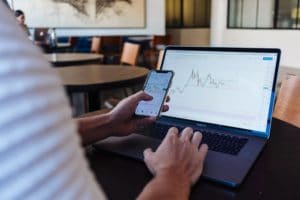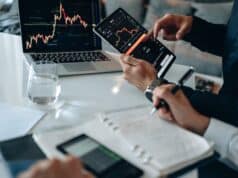
Forex trading used to be a type of trading that only big corporations and highly experienced brokers were involved in. However, this has changed in the last couple of years, with forex trading becoming more accessible to anyone – even individuals who don’t have a finance background or a related college degree. With the right attitude, a lot of commitment, and dedication to learn all the basics, the ins and outs of forex trading, anyone can learn how to do this correctly.
An essential and noteworthy mention would be not to assume from the beginning that forex trading will instantly make you rich, as that is not the case. The most common misconception is that forex exchange trading signifies instant money. While it is true that with experience and vast knowledge on this subject and how to trade, you will manage to earn good money, it is of the utmost importance to realize the risks involved in trading and understand that success and making money is not a guarantee.
In order to be a forex trader, you must acquire the necessary skills the extensive knowledge and be committed to learning constantly. For this, you also need to have patience, given that this field, although more accessible now, is far from easy or straightforward. The information is comprehensive, thorough, and, at times, heavy. Therefore, you should be aware that the learning process can be lengthy, and it can take time until you can start trading forex in the real world, or that it will be a while until you can see the results of your hard work and be successful.
The most reliable and accurate hard-coded signal forex telegram from Learn 2 Trade – with years of experience in the industry, their team of experts provides users with top-quality signals that always keep them one step ahead of the competition.
So, where do you start if you want to get involved in forex trading?
First and foremost, it is vital to learn the basics and facts of foreign exchange and everything related to this market. As a beginner, this initial stage in your forex trading journey is for laying the foundations. This ensures you understand the following, more in-depth and complex information you need to acquire, given that it will be put in a context, making it easier for you to digest it.
This being said, here is the ultimate beginner’s guide to forex trading that may help you get started:
What Is Forex Trading?
By definition, forex trading is the process of exchanging two types of currency for various purposes and reasons, such as commerce and trading. Among all the financial markets, the foreign exchange market, also referred to as forex or FX, is the largest. Understandably, this can be pretty intimidating to a newcomer to this world. But the good news is that you can take the time to learn all the ins and outs of this field until you are confident enough to trade currencies against one another.
A vital mention would be that the FX market also holds the title for the most liquid asset markets worldwide, thanks to the global reach when it comes to trading and finance.
3 Crucial Things To Know About The Forex Market
For any novice individuals who want to get started in forex trading, it is necessary to learn a few basic concepts of the FX market and learn how it works in order to lay a foundation and be prepared to accumulate experience. The following represent must-know information for beginners.
1. OTC And 24-Hour Window Trading
The one key aspect that differentiates the FX market from the other financial markets is the fact that there is no centralized exchange marketplace where transactions occur. Instead, everything happens electronically and over the counter or OTC. Because this is such an international market, it is imperative that trading is conducted via secure networks that allow every trader and broker on every continent to access the marketplace.
For the same reason, the FX market is open for an extended period of time, specifically for almost six days per week and for 24 hours. Only this way is every financial center around the world in nearly all time zones able to get involved in currency trading.
2. The Role of The Forex Broker
Traders across the world and from various backgrounds and industries must access a trading platform where they can perform and apply the chosen strategies to buy and sell foreign currencies. The role of a forex broker is to allow traders needed access to these platforms to begin trading.
As a beginner, and in forex trading in general, choosing low spread currency pairs is highly advisable. This is a good strategy because you want to aim for low volatility and high liquidity, which happens in the case of a low spread, given that the bid and ask price aren’t too different. For this reason, you may want to refer to FX brokers who have this low spread. Not to mention that some may have it for important currency pairs.
3. Understanding Forex Margin
There are many forex terminologies you will need to learn throughout your forex trading journey. But one of them is forex margin – a form of security deposit used by a broker on the duration of forex trade. Before you can begin placing a trade, you need to deposit an amount of money that ensures you can open and maintain your position in a chosen currency. There are two forex margin types to be aware of:
- Initial Margin: minimum amount required to open a position;
- Variation Margin: calculated by considering the value of all positions opened and used as a method to mitigate risks for both brokers and traders.
Taking this into consideration, you can better understand how this works when you create your account and how it can translate into more significant profits later on when you gather enough experience.
Test, And Then Test Again
As soon as you choose the forex exchange pair on which you want to focus and research both currencies well, you can start applying what you have learned. The best and most recommended way of getting started in forex trading is by creating a demo account where you can practice as much as possible.
And because this demo account resembles real-life trading perfectly, you will be able to learn while putting theory into practice. Not to mention that this is the most effective way of learning from your mistakes, given that there are no significant consequences, such as losing a large amount of money.








